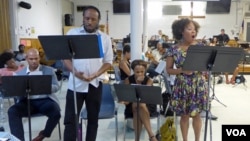Harry Lawrence Freeman’s opera Voodoo has been revived in New York for its first performance since 1928. The opera centers on a character named Lolo, a Louisiana plantation worker and Voodoo priestess.
In the 1920s and 30s, there was an explosion of African-American literature and music in New York City’s Harlem neighborhood. Some of the artists from what’s known as the Harlem Renaissance are still mainstays of American, and in some cases international culture. Those include familiar authors like Langston Hughes and Zora Neale Hurston and musicians like Duke Ellington and Fats Waller.
Last weekend, New York audiences were able to hear an opera from that time by a composer you likely have not heard of: Harry Lawrence Freeman. It’s called Voodoo and the opera’s presenters hope that these performances begin a new renaissance for its composer.
About eight years ago, as a grad student, Annie Holt was working in Columbia University’s Rare Books and Manuscripts Library when she was assigned to catalogue the work of Harry Lawrence Freeman, a largely forgotten Harlem-based composer from the early 20th century.
"And it was fabulous! I had the honor of going through all the cardboard boxes that came right from his family’s house and unearthing everything and I, for myself, discovered how amazing his story was and how amazing his music is, in my opinion. And I’ve really been trying to get one of his operas produced since that time," she said.
Holt is now artistic director of Morningside Opera and she collaborated with Harlem Opera Theater and the Harlem Chamber Players to present two concert performances of Freeman’s Voodoo. Holt said Freeman wrote both the music and the libretto for the opera, which was set on a Louisiana plantation after the Civil War.
"For me, that was a really interesting topic, especially looking at Freeman’s historical moment during the Harlem Renaissance and the idea of African-Americans reflecting upon racial identity in the 75 years after the Civil War," she said.
Freeman was born in Cleveland, Ohio just four years after the Civil War. He began to write operas when, at the age of 18, he heard German composer Richard Wagner’s Tannhauser. Freeman moved to Harlem in 1908, established both a music school and the Negro Grand Opera Company, and was a friend and colleague of the King of Ragtime, composer Scott Joplin. He wrote over twenty operas in his lifetime.
Harlem Opera Theater’s artistic director Gregory Hopkins said while he heard Wagner’s influence in Freeman’s music, he heard a lot of other influences, too.
"Certainly you hear the colloquial music of the time; there’s a cake walk, there’s a buck dance, there’s even a voodoo dance. And you hear the interpolation of spirituals, which were so important to the development of the entire artistic tapestry of the Renaissance," he said.
The use of spirituals in the context of Voodoo is very much plot-driven. The story is a classic love triangle between two women and one man. A spurned lover rejects her faith to use of the magical powers of voodoo. Director Melissa Crespo said she conjured a giant python and a magic tree and even killed her rival… who was then revived, miraculously, by holy water.
"It’s a battle of Christianity and it’s a battle of the voodoo magic at play and, you know, which one is gonna win," she said. "It’s a big, giant story; everyone has a lot of feelings [laughs] and they’re feeling their feelings all over the stage! But that’s the beauty of opera,"
When Voodoo premiered on Broadway in 1928, it got some good notices in the African-American press, but The New York Times called it “naïve,” and it was never performed again. It was very much of its time, including language audiences now find racist. And, although Harry Lawrence Freeman may have been known during the Harlem Renaissance, his music was never published.
Conductor Gregory Hopkins said he and his collaborators hoped that Voodoo would resurrect Freeman’s name.
"I don’t think the work or the composer will be obscure for too long," he said.





